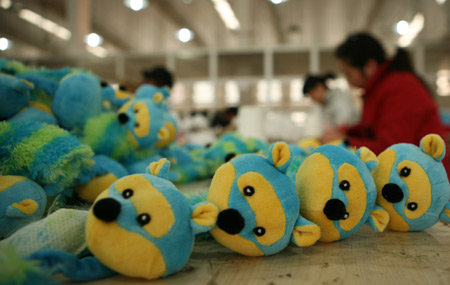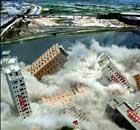Top Biz News
The high cost of meeting global standards
By Chen Limin (China Daily)
Updated: 2009-12-28 08:08
 |
Large Medium Small |
|
 Staff toys are processed in a workshop at Anhui Mengcheng Tongfu Gift Company. Chinese toy exporters are making efforts to strengthen quality inspections to meet the ever-increasingly strict standards of developed markets. [CFP] |
Wang Long remembers well how the toys produced by his company were almost blocked from export once because of a sudden change in toy requirements by an importing country.
Now, he says he is confident about meeting the tough new standards set by importers.
His company, Guangdong Alpha Animation and Culture Co Ltd, a leading company in China's animation industry, is expected to have doubled its toy sales abroad in 2009, reaching $17.2 million.
Wang, a laboratory director at the company, said the success didn't come easily.
"We've been under much export pressure in recent years, especially with the increasing technological trade barriers," he said.
In 2009 alone, the EU and the United States put in place new toy directives. Other countries, such as Canada and Malaysia, also set new chemical requirements on toys.
According to the EU's Rapid Alert System for Non-Food Products (RAPEX), during the third quarter of 2009, the EU made 130 notifications of dangerous toys, 101 of which were related to China, including Hong Kong and Taiwan.
Statistics from the Ministry of Commerce showed that from January to September of 2009, 19 countries launched 88 probes into Chinese products worth $10.2 billion. These included 57 cases of anti-dumping, nine of anti-subsidy, 15 of safeguarding measures and seven of special protection.
Alpha is just one among many companies that have made "quite a big effort" to cope with the export pressure.
Efforts
Wang said things were going well until the EU's Waste Electrical and Electronic Equipment (WEEE) and Restriction of Hazardous Substances (RoHS) directives, which restrict the use and disposal of hazardous substances in electrical and electronic equipment, came into force.
The company knew it would lose out if it didn't do anything to check chemicals in its products, so it set up a laboratory before the directives could actually have an impact on its toy sales abroad.
It then built a system that could identify, control, and analyze the introduction of hazardous substances into its products during all the processes related to manufacturing.
"The average cost of our toys increased by 20 percent because of the system, but we haven't failed once to export our toys because of quality problems so far," said Wang.
More companies are making similar efforts. TCL, China's top TV maker, has invested 100 million yuan in recent years to build a "factory-to-market corridor", an inspection center, through which TCL can cooperate with third-party testing companies to inspect the design, manufacturing, and transport processes of its goods.
"In the past, Chinese companies went through testing and inspection very passively, but now more and more of them are starting to seek related services from the very beginning of the research and development process as a way of upgrading their quality control systems," said Wolfhart Hauser, CEO of Intertek, a global quality and safety services company, and the first of its kind to go into business in China.
| ||||
Haier, China's largest white-goods manufacturer, has taken part in setting 19 international and 215 national standards, with five and 172 of them respectively of them now in force.
"If you take the initiative to set a new international standard, you have more say in the industry, " said Zhang Ruimin, CEO of Haier.
Beyond standards
"For Chinese companies, export difficulties also come from the appreciation of the yuan, the rise in the price of raw materials and increasing labor costs," said Li Lei, marketing manager of leading system and services certification company SGS China.
Some companies choose to make use of their international presence to handle the challenges.
Haier, with more than 30 overseas manufacturing bases, diversifies the countries exports to, in an effort to spread risks and not be reliant on just one market.
"In some countries, the currencies devalue, and this is more favorable for exporters," Zhang Ruimin was quoted by Xinhua as saying. He added that China often suffers from certain trade restrictions so making goods globally rather than just in China can make business easier.













